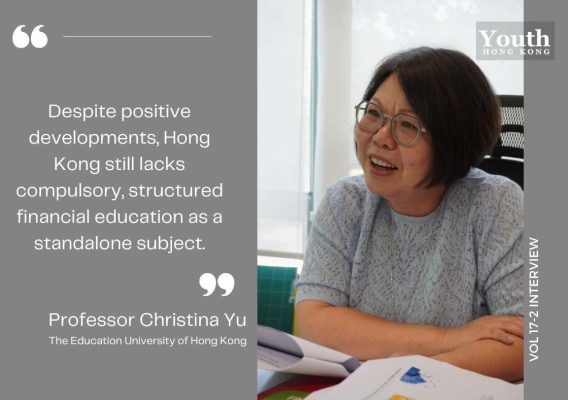The Irreplaceable Value of Financial Wisdom
— An interview with Professor Christina Yu from The Education University of Hong Kong
How to nurture a fiscally responsible generation?
Christina Yu from The Education University of Hong Kong looks at the city’s multifaceted financial education landscape, its persistent challenges and evolving nature in the digital age. Fundamentally, Professor Yu believes financial literacy is a vital life skill that goes beyond mere money management – it is about values, life choices, and the responsibilities individuals must embrace.
A Growing Imperative
Professor Yu’s journey in financial education advocacy began around 2009, following the global financial tsunami and the collapse of Lehman Brothers, which in Hong Kong included the 「Lehman Minibonds crisis.」 The value of these investment products plummeted, severely impacting tens of thousands of retail investors and sparking widespread public outcry and regulatory scrutiny. Many of the affected investors claimed that they did not fully understand the risks involved, and this acted as a catalyst for advancing financial education and investor protection in Hong Kong.
「It was quite alarming at that time,」 Professor Yu recalls. 「What went wrong with the financial sector, and how did so many people suffer as a result of their investments?」 This pivotal moment made her shift her focus from entrepreneurship education to understanding how financial literacy could prevent such a catastrophe from happening again.
Professor Yu was actively involved in the Investor and Financial Education Council since its founding in 2012, leading a team that created the Hong Kong Financial Competency Framework, which identifies a set of knowledge, skills, attitudes, motivations and behaviours required for such literacy. The framework emphasises the increased financial burden being felt by the younger generation.
Nowadays, given technological advancements, an increasingly aged population, high healthcare costs, the rise of e-shopping and young people’s pervasive tendency to overspend, financial education has become ever more crucial. 「How can we control ourselves, manage our money better, and be well-prepared for future life and retirement?」 Professor Yu asks.
In spite of the relatively good financial knowledge of Hong Kong people, partly due to the city’s status as a financial hub, Professor Yu notes that attitudes towards money management and investment behaviour require more attention. She cited 2025 research from The Hong Kong Federation of Youth Groups, which found that about 40% of Hong Kong youth aged 15 to 24 faced challenges related to money management.
In another survey, conducted by MWYO in 2022, the average financial management ability score of students was 12.7 out of a maximum of 21. The scores for financial knowledge, behaviour, and attitude were 5.5 out of 7, 4.1 out of 9, and 3 out of 5, respectively. These figures indicate room for improvement in young people’s financial management, including their budgeting, saving, investing and managing debt skills.
Beyond just the management of finances, Professor Yu also pointed out the importance and linkage between financial wellbeing and emotional wellbeing. 「If you have financial wellbeing, you will be more emotionally stable,」 she points out, since financial stability can ease the burdens and insecurity associated with money troubles.
Early Foundations
Professor Yu points out the importance of a structured financial education curriculum for improving levels of financial literacy and helping young people make sensible decisions about money. In recent years, Hong Kong has introduced two key curriculum developments in financial education targeting upper primary and junior secondary students. The subject is now an optional module of the secondary school Citizenship, Economics and Society curriculum. It has also been introduced into the Primary Humanities curriculum as one of the six key learning areas.
Despite these positive developments, Professor Yu points out that Hong Kong still lacks comprehensive and structured financial education as a standalone subject, compared to the curriculum in the UK, Australia and Singapore. The fragmented nature of the current approach, she says, often results in a lack of depth, consistency and practical relevance.
Caption: The curriculum under the Hong Kong Jockey Club Financial Education Programme is designed based on the financial capability framework developed by the University of Chicago Financial Education Initiative (UCFEI) and the Hong Kong Competency Framework by the Hong Kong Competency Framework by the Investor and Financial Education Council (IFEC).
Fortunately, other sectors, especially Hong Kong NGOs, are playing a bigger role in developing a more holistic approach to financial education. One recent encouraging example is the Hong Kong Jockey Club Financial Education Programme, which supports a more integrated approach in upper primary schools. The programme, launched in 2024, currently involves around 70 primary schools, reaching approximately 17,800 students, 240 teachers, and 1,500 parents through various workshops and activities. As the principal investigator of this project, Professor Yu thinks it introduces financial education systematically while combining extracurricular activities, teacher training and parent education.
Hong Kong still lacks compulsory, structured financial education as a standalone subject.
However, she notes that teacher training has not caught up yet, and many teachers may not fully understand the importance of financial education beyond a basic saving habit. When asked about the optimal age to begin financial education, Professor Yu says it should start “as early as possible,」 adding that research indicates that children can start developing foundational financial literacy skills between the ages of three and five, with financial habits beginning to form around six or seven.
“Children don’t even realise what money is and consider the Octopus』 beep to be a form of money,” she shares. “During teacher training, some teachers have even asked me about the nature of Octopus card. This shows the profound effect of technology on concepts of money.”
In a gist, young children should learn the difference between sharing, borrowing and exchange to grasp the fundamental concepts in finance first, she says. Then junior primary students can learn to protect property and discuss money with parents. Upper primary students are able to understand needs versus wants, goal setting and saving. Secondary students should learn more advanced money management, potentially sharing in household financial discussions and understanding the cost of living. At this age, 「They should not only ask for money from mom but share the family financial burdens,」 Professor Yu clarifies.
Overcoming Hurdles
Promoting financial education in Hong Kong is not without obstacles. First, some parents avoid money discussions at home because they believe children are too young to understand or be involved. Nevertheless, as Professor Yu notes, 「The family home is the first classroom for financial education.」 She highlights the need for parents to encourage financial discussions at home, involve children in household budgeting and provide small allowances to teach them about money management.

A Lunar New Year Red Packets game designed by The Hong Kong Jockey Club Financial Education Programme.
Conceptual misunderstandings among parents include the belief that teaching children about money will make them materialistic. Another misconception is that poor families don’t have enough money to manage. Professor Yu refutes this and argues that financial education is even more crucial for vulnerable groups. 「I keep telling them that they cannot afford to lose, and they only have this one chance to manage their limited money in a very, very careful way,」 she says, underscoring the need to maximise the value of every cent and make the most informed decisions possible.
Recounting the story of the single mother defrauded by an unscrupulous insurance broker for nine years, Professor Yu recognises the urgent need to prevent a repeat of such a “sad story” by promoting financial education, especially for women and children. Globally, women still receive less formal education than men and can be particularly hesitant about arithmetic, which inevitably hinders their financial knowledge. On the other hand, children often actively spend money, especially on online games, without understanding the implications.
Reshaped by Technology
The digital revolution has reshaped financial literacy profoundly. While the core financial concepts remain, the context has changed. For example, digital payment systems like the Octopus card can lead to a disconnect from real money and sometimes people forget the hard work involved in earning the digital money they spend every day.
Nowadays, Professor Yu thinks financial literacy must include understanding how AI influences financial behaviour, the decision-making process and risk management. AI is poised to further influence financial management, potentially simplifying financial concepts and offering personalised budgeting and savings plans. This necessitates integrating technology with financial education, a trend already seen in countries like Canada, which is merging STEM and financial literacy programmes.
Professor Yu also points out the complicated digital security issues associated with the rise of online transactions, scams and fraud, especially among younger children. She stresses that it is essential for them to understand how to protect sensitive information, recognise phishing attempts, and evaluate the credibility of online platforms.
Looking ahead, Professor Yu believes digital finance and green finance will be key trends. She sees a need for better understanding of both the current status and future directions that financial literacy may take. Achieving this requires a multi-stakeholder approach involving the government, schools, corporations and the general public. ■





